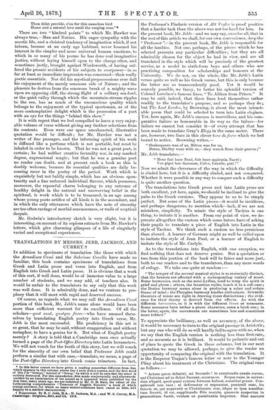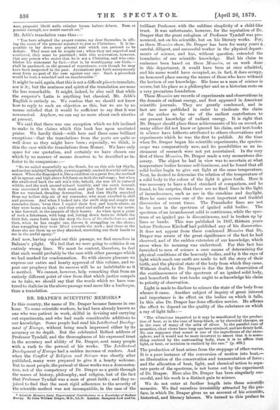TRANSLATIONS BY MESSRS. JEBB, JACKSON, AND CURREY.t IN addition to
specimens of translation like those with which the Arundin,es Cami and the Sabriacte Corolla have made us familiar, this book contains specimens of translations from Greek and Latin prose and verse into English, and from English into Greek and Latin prose. It is obvious that a work of this sort, if well done, would be of immense value to a large number of students, and we may add, of teachers also. It would be unfair to the translators to say only that this work was well done. It is admirably done, and we venture to pro- phesy that it will meet with rapid and deserved success.
Of course, as regards what we may call the Arundines Cami portion of this book, Mr, Jebb's name alone would have been more than sufficient warrant for its excellence. Of all the scholars—pot sunf, guotque fuere—who have amused them- selves by translating English poetry into Greek verse, Mr. Jebb is the most successful. His proficiency in this art is so great, that he may be said, without exaggeration and without metaphor, to have a genius for it. But what of English poetry merely P A story is told that a Cambridge man once actually turned a page of the Post-Office Directory into Latin hexameters. We will not vouch for the truth of this story, but we will vouch for the sincerity of our own belief that Professor Jebb could perform a similar feat with ease,—translate, we mean, a page of the Post-Ojfice Directory into Greek comic trimeters. In fact,
• In this latter sonnet we have given a reading somewhat different from that which appears in this volume, where line 4 ends with a comma, and the first word of line 51a " Grasps," instead of "Grasp," by which it will be seen that the sense is entirely destroyed. For this emendation, first made conjecturally, and afterwards verified by an examination of the sonnet as it appeared when published for the first time, many years ago, we are indebted to Mr. D. M. Main, the editor of the forthcoming comprehensive "Treasury of English Sonnets," • book of which textual accuracy, for which so many sonnet-collectors have cared so little, will happily be a marked characteristic.
t Translations. By B. C. Jebb, M.A.; K. Jackson, M.A. ; and W. S. Currey, M.A. Cambridge: Deighton, Bell, and Co. 1878.
the Professor's Pindaric version of AU Vogler is proof positive that a harder task than the above was not too hard for him. In the present book, Mr. Jebb—and we may say, once for all, that in the rest of this article we shall, for our own convenience, drop the " Professor '!—in the present book, Mr. Jebb is responsible for all the iambics. Not one, perhaps, of the pieces which he has selected presents any particular difficulties ; but they are all admirably chosen for the object he had in view, and are all translated in the style which will be precisely of the greatest service, as a model to sixth-form boys and others who are practising composition for scholarships and honours at the University. We do not, on the whole, like Mr. Jebb's Latin verses quite so well as his Greek verses, but this is only because the latter are so transcendently good. Yet it would be scarcely possible, we fancy, to better his splendid version of Colonel Lovelace's famous lines, " To Althea from Prison." It may be said, indeed, that these lines lend themselves rather readily to the translator's purpose, and so perhaps they do ; but The Lost Leader, by Browning, is about the most intract- able poem that could be selected to turn into Latin elegiacs.. Yet, here again, Mr. Jebb's success is marvellous, and his com- parative failure as honourable in its way as the failure—for failure we cannot but consider it—of every attempt that has been made to translate Gray's Elegy in the same metre. There
are, however, two lines in this clever tour de force which we feel bound to notice. Browning writes,— "Shakespeare was of us, Milton was for us,
Burns, Shelley were with us,—they watch from their graves ;" Mr. Jebb translates,— " Mens fuit haec Enni, fuit haec sapientia Naevi ; Vos piget hoc damnum, Calve, Catulle, pati 1"
Now we admit the cleverness of the way in which the difficulty is eluded here, but it is a difficulty eluded, and not conquered. Whether it were possible in any way to conquer such a difficulty is quite another question.
The translations into Greek prose and into Latin prose are both excellent, yet here, again, we should be inclined to give the palm to the Greek versions. They appear to us to be simply perfect. But some of the Latin pieces—it would be invidious,. and perhaps dangerous, to mention which—lack, if we are not mistaken, simplicity. To mimic the style of Tacitus is one thing, to imitate it is another. From our point of view, we de- precate altogether the custom which some tutors have of asking their pupils to translate a piece of English into Latin in the style of Tacitus. We think such a custom no less pernicious than absurd. A learner of German might as well be called upon to imitate the style of Jean Paul, or a learner of English to imitate the style of Mr. Carlyle.
As to the translations into English, with one exception, we find nothing that does not deserve praise. But a quotation or two from this portion of the book will be fairer and more just,. both to our readers and to the translators, than any mere words of eulogy. We take one quite at random :—
" The temper of the several musical styles is so essentially distinct, that the hearers are affected with a corresponding variety of mood- Some harmonies, such as the semi-Lydian, tend to wrap the spirit in grief and gloom ; others, the luxurious styles, touch it to a soft ease ; the Dorian harmony seems alone in producing a sober and sedate- frame of mind ; the Phrygian harmony kindles enthusiasm. Scientific- theorists of music are right in drawing these distinctions ; the evid- ence for their theory is derived from the effects. As with the different harmonies, so it is with the different times or measures.. Some measures have rather a grave character, some a brisk one ; in the latter, again, the movements are sometimes less and sometimes- more refined."
To appreciate the brilliancy, as well as accuracy, of the above, it would be necessary to turn to the original passage in Aristotle;
but any one who will do so will hardly fail to agree with us, when we say that the English version is nothing less than first-rate, and as accurate as it is brilliant. It would be pedantic and out• of place to quote the Greek in these columns, but in our next quotation we may be allowed, perhaps, to give the reader an opportunity of comparing the original with the translation. It is the Emperor Trajan's famous letter or note to the Younger Pliny about his treatment of the Christians. The original runs as follows :—
" Actum quem debnisti, mi Seeunde ! in exentiendis cassia eornm, qui Christi= ad to delati fnerunt, secntus es. Neque enim in univer- sum aliquid, quod quasi certam formam habeat, constitui potent. Con- quirendi non sent: si deferantur et argnuntur, puniendi aunt, ita tames, nt, qui negaverit se Christiannm esse, idque re ipsa manifes- t= fecerit, id est, supplicando Diis nostril, quamvis suspectus in praeteritnm fuerit, veniam ex poenitentia impetret. Sine auctore
Vero propositi libelli nullo crimine locum habero debent. Nam et pessimi exempli, nec nostri saeculi est."
Mr. Jebb's translation runs thus :-
" You have adopted the proper course, my dear Sem:Indus, in sift- ing the cases of the persons reported to you as Christians. It is im- possible to lay down any general rule which can pretend to be definite. They must not be sought out ; when they are reported and convicted, they must be punished ; with this reservation, however, that any person who states that he is not a Christian, and who esta- blishes his statement by fact,—that is, by worshipping our Gods,— shall be pardoned, on the ground of repentance, even though he may have been suspected in the past. Accusations pat forth anonymonsly must form no part of the case against any one. Such a precedent would be both a mischief and an anachronism."
It might be said, again, that this is not a difficult piece to translate, nor is it; but the neatness and spirit of the translation are none the less remarkable. It might, indeed, be also said that while the emperor's Latin is anything but classical, Mr. Jebb's English is entirely so. We confess that we should not know how to reply to such an objection as this, but we are by no means satisfied that it would be sufficient to say that it was nonsensical. Anyhow, we can say no more about such niceties at present.
We said that there was one exception which we felt inclined to make in the claims which this book has upon unstinted praise. We hardly think—with here and there some brilliant exceptions—that the translations from the poets are quite so well done as they might have been ; especially, we think, is this the case with the translations from Homer. We have only space for one quotation, and certainly we have chosen one which by no manner of means deserves to be described as in- ferior to its companions :—
" So we sailed mournfully np the Strait, for on this side lay Skylla, andon that mighty Charybdis, yawning grimly, sucked down the salt sea- water. When she disgorged it, like a cauldron on a great fire, she seethed all in uproar, and high above fell foam on both the tall crags ; but when she swallowed back the salt sea's tide, behold, she was all in turmoil within, and the rock around echoed horribly, and the earth beneath was uncovered with its dark sand, and pale fear seized the men. Her we watched, dreading destruction. And then Skylla snatched from my hollow ship six of my comrades, who most excelled in skill and prowess. And when I looked into the swift ship and sought my comrades there, 'twas then I espied their feet and hands above, as they were borne on high ; and they cried and called me by my name, a last farewell, in the anguish of their hearts. As when upon a point of rock a fisherman, with long rod, letting down baits to delude the little fish, casts forth into the deep the horn of the shelterless or, and then, when he has caught one, throws it struggling on the shore ; thus struggling they were lifted towards the rock ; and there at the doors she ate them up as they shrieked, stretching out their hands to me in the awful agony."
And now, having copied out this passage, we find ourselves in Balaam's plight. We feel that we were going to criticise it on entirely wrong lines. We must be content, therefore, to feel that such would probably be the case with other passages which we had marked for condemnation. So with sincere pleasure we express our entire and hearty approval of this volume, and re- peat our prophecy that its success will be as indubitable as it is merited. We cannot, however, help remarking that from an entirely different point of view from that which justice compels us to take, we should say that the words which we have ven- tured to italicise in the above passage read more like a burlesque, than a translation.



































 Previous page
Previous page